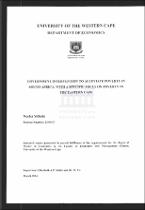Government intervention to alleviate poverty in South Africa, with a specific focus on poverty in the Eastern Cape
Abstract
When the new democratic government in South Africa came to power in 7994, it inherited a legacy of inequality, unemployment and poverty. Mindful of this triple challenge the government's first socio-economic policy framework, the White Paper on Reconstruction and
Development (RDP) of 1994, stated the commitment to priorities poverty eradication in South Africa. The Bill of Rights guarantees specific rights, referring to housing, healthcare and social security, to empower the poor. The greatest challenge facing the South African government was to provide the institutional support and to implement appropriate policies to reduce the extent of poverty and
unemployment in South Africa. The government therefore established the necessary legislature and institutions and embarked on numerous policy strategies. A fact that complicates policy intervention is that the extent of poverty is very different across provinces. Households in rural areas are in a relatively worse position than households in urban areas and rural woman are in an even worse position. According to official statistics from Statistics South Africa, Limpopo and the Eastern Cape are the poorest provinces. This study investigated the nature of government intervention towards poverty relief. Through the use of various instruments, such as social grants, the delivery of basic services
and housing, the government focuses on the relief of income, non-income and asset poverty. The main aim of this study was to answer the question of whether government intervention has made any difference to the quality of life of the poor. The situation of the Eastern Cape
was investigated as a case study of the larger poverty problem and focused primarily on income, non-income and asset poverty. As is the position nationally, the majority of the poor in the Eastern Cape live in the rural areas and women and the youth are the worst affected groups. The empirical analysis shows that both income and non-income poverty has declined in Eastern Cape, particularly since 2000. The study also pointed out various instances of government failure and other specific challenges. However, despite the fact that poverty relief has been a policy priority since 1994 and despite numerous policies and programmes, the extent of poverty remains unacceptable.

